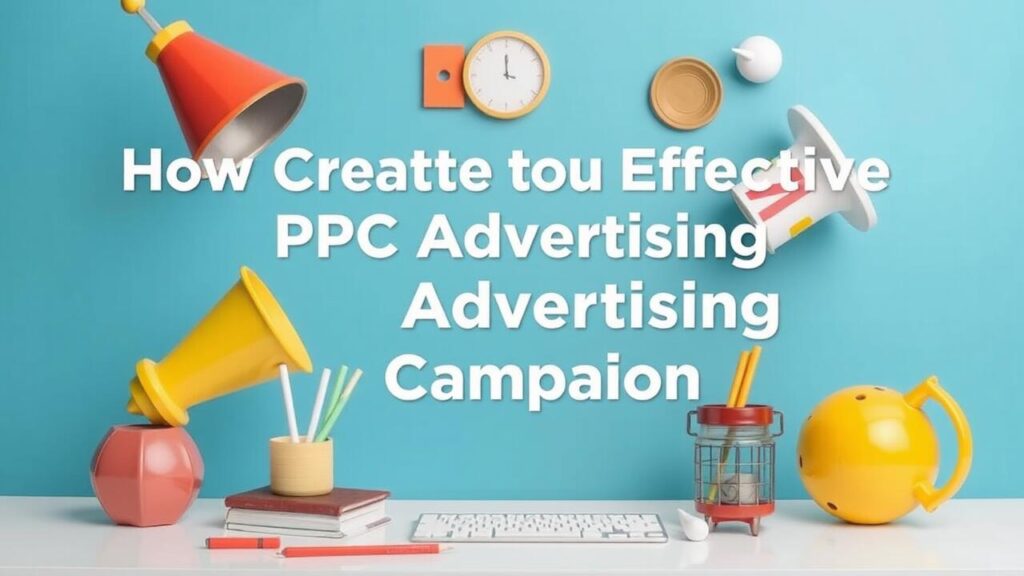How to Create an Effective PPC Advertising Campaign
How to Create an Effective PPC Advertising Campaign for Maximum Results
Creating an effective PPC advertising campaign involves a blend of strategic planning and meticulous execution. Understanding the intricacies of pay-per-click (PPC) marketing is crucial. This includes thorough advertising research to identify target audiences and potential keywords. An effective ads campaign will leverage these insights to craft compelling ad copy that resonates with users. Implementing the right marketing strategies and utilizing appropriate marketing tools help in measuring performance and optimizing efforts. By mastering these elements, marketers can navigate the complexities of PPC and significantly improve their ad campaign outcomes. Learning how to create an effective PPC advertising campaign lays the foundation for successful content marketing initiatives.
How to Create an Effective PPC Advertising Campaign | Definition of PPC Marketing
PPC marketing, or pay-per-click advertising, is a digital marketing strategy where advertisers pay a fee each time their ads are clicked. This approach allows businesses to gain visibility through various platforms like Bing Ads and Facebook Ads. To create an effective PPC advertising campaign, marketers must focus on crafting compelling ad copies and strategically managing their CPC bidding. The effectiveness of display ads relies significantly on the quality of the ads and the relevance to the target audience.
Understanding CPCs is crucial for optimizing campaign performance. Advertisers can benefit from utilizing Microsoft Advertising to reach a broader audience while managing costs effectively. A well-structured PPC campaign not only focuses on the ad copy but also on keyword selection and competitive bidding strategies. Knowledge of how to create an effective PPC advertising campaign is essential for driving traffic and conversions.
- Define your target audience to tailor your ads effectively.
- Conduct thorough keyword research to identify high-performing keywords.
- Utilize A/B testing to experiment with different ad copies and formats.
- Monitor and analyze campaign performance regularly to make data-driven adjustments.
- Set clear goals and KPIs to measure the success of your PPC campaigns.
- Optimize landing pages to ensure a smooth user experience and increase conversions.
- Stay updated on industry trends and changes in PPC advertising platforms.
Benefits of Implementing a PPC Campaign
Implementing a PPC campaign offers a direct pathway to reach specific customer demographics through targeted advertising. By utilizing sponsored content on platforms like Google Ads, businesses can effectively position their products or services in front of potential customers searching for related terms. The auction-based model of PPC allows advertisers to bid on keywords relevant to their offerings, ensuring that their ads appear prominently when users engage in search engine marketing. This precision not only enhances brand awareness but also leads to better engagement with audiences who are already interested in making a purchase.
The cost-per-click (CPC) structure of PPC campaigns enables businesses to control their advertising expenses while maximizing returns. Each click represents a potential customer entering the sales funnel, especially valuable for ecommerce ventures that rely on online transactions. By analyzing the propositions presented in ads and the corresponding conversion rates, advertisers can quickly identify what resonates with their audience. Knowing how to create an effective PPC advertising campaign becomes crucial for driving traffic and generating sales.
Key Components of an Effective PPC Campaign
An effective PPC campaign hinges on several key components that are essential for success. Understanding how to create an effective PPC advertising campaign begins with comprehensive keyword research. This helps identify the terms that potential customers are searching for, positioning your ads strategically in competitive auctions. Setting clear goals for your PPC campaigns ensures that you can measure success accurately, whether focusing on brand awareness or direct conversions. Structuring your PPC campaign thoughtfully enhances its effectiveness, allowing for easier management and optimization. Each of these elements contributes to building a competitive PPC campaign that stands out in the crowded marketplace, paving the way for successful PPC campaigns that drive substantial results.
Keyword Research for PPC Ads
Keyword research is a fundamental step in learning how to create an effective PPC advertising campaign. It involves identifying high-performing keywords that align with your target audience’s search intent and your business objectives. Utilizing various PPC marketing tools can help discover popular PPC marketing terms that resonate with potential customers. Effective keyword targeting ensures that your PPC search campaigns reach the right audience, increasing the chances of converting clicks into sales. For ecommerce PPC campaigns, focusing on relevant keywords can significantly enhance ad visibility and drive traffic to your online platform.
Selecting the right keywords is crucial for developing a competitive PPC strategy. Basic PPC ads require thorough research to ensure they capture user interest and generate clicks. By analyzing competitors and their keyword choices, advertisers can build a competitive PPC strategy that will stand out in the marketplace. Employing a combination of short-tail and long-tail keywords can help optimize PPC search ads. This approach not only improves ad relevance but also increases the likelihood of achieving a successful and effective PPC strategy.
- Identify high-performing keywords through market research and analysis.
- Use PPC marketing tools to uncover trending and relevant keywords.
- Analyze competitors’ keyword strategies for insights and inspiration.
- Incorporate a mix of short-tail and long-tail keywords in your campaigns.
- Regularly review and update your keyword list based on performance metrics.
- Test different ad copies using various keywords to determine which performs best.
- Monitor industry trends to stay ahead in keyword selection and targeting.
Setting Goals for PPC Campaigns
Establishing clear ppc goals is essential for anyone looking to create an effective PPC advertising campaign. Effective PPC managers understand that goals guide the overall ppc strategy, influencing how to create campaigns and decide on specific ppc tactics. Common ppc goals include increasing brand awareness, generating leads, or boosting sales. By outlining these objectives, ppc marketers can develop sophisticated ppc strategies tailored to meet their unique business needs.
To implement a quick ppc strategy, it is crucial to align your goals with measurable outcomes. This means setting specific benchmarks for your ppc accounts to evaluate success effectively. Creating campaigns that focus on targeted keywords and effective ad placements can lead to achieving these ppc goals. Successful PPC marketers continuously monitor their progress and adjust their strategies based on performance data, ensuring that their campaigns evolve to meet shifting market demands.
Developing a Winning PPC Campaign Strategy
Creating a refined PPC strategy involves understanding how to create an effective PPC advertising campaign tailored to your audience. A skilled PPC professional crafts individual campaigns that align with specific goals, ensuring that each ad resonates with its target demographic. Effective campaign strategies utilize various PPC platforms to maximize visibility and drive traffic ppc to your website. For businesses with multiple campaigns, consistent ppc optimization is critical for monitoring performance and making adjustments. Investing wisely in PPC requires a knowledgeable approach to ppc strategy optimization, balancing budget and outcome to achieve the best return on ppc investment. The right structure and messaging will significantly enhance campaign effectiveness.
Structuring Your PPC Campaign
An effective structure is crucial for any PPC campaign. Various campaign types, such as display campaigns, sales campaigns, and targeted campaigns, require unique approaches. Each individual campaign should align with your overall marketing goals and specific objectives. For ecommerce campaigns, leveraging a ppc keyword tool can significantly enhance targeting precision, ensuring that your ads reach the right audience. Understanding how to create an effective PPC advertising campaign is essential for maximizing results.
Establishing a structured approach to your own campaigns within the chosen PPC platform can lead to better performance metrics. By segmenting your campaigns based on specific products, services, or audience demographics, you can refine your advertising efforts. This not only simplifies management but also allows for more effective monitoring of each campaign’s performance. Ultimately, knowledge of how to create an effective PPC advertising campaign can empower marketers to achieve outstanding results in the competitive PPC world.
| Campaign Type | Main Objective | Target Audience | Key Metrics |
|---|---|---|---|
| Display Campaign | Brand Awareness | General Audience | Impressions, CTR |
| Sales Campaign | Increase Sales | Shopping Enthusiasts | Conversions, ROAS |
| Targeted Campaign | Lead Generation | Specific Demographics | CPL, Engagement Rate |
| Remarketing Campaign | Re-engagement | Previous Site Visitors | Repeat Visitors, Conversion Rate |
Creating Compelling Ad Copy
Crafting compelling ad copy is essential for any successful PPC campaign. Strong ad copy not only attracts attention but also drives action towards your marketing objectives. A well-structured Google Ads campaign should reflect your content marketing strategy and highlight the unique selling points of your products or services. Focus on delivering clear, engaging messages that resonate with your target audience, ensuring that each campaign aligns with your overall marketing goals.
Tailoring your ad copy for different campaign types, such as search ads campaigns or display network campaigns, can significantly enhance performance. Highlight specific features and benefits that appeal to potential customers, especially within multiple display campaigns. By creating ads that are directly linked to your individual campaign budgets and campaign goals, you foster a better connection with your audience, ultimately leading to improved conversion rates. Understanding how to create an effective PPC advertising campaign hinges on the ability to write copy that compels users to take action.
Selecting the Right PPC Marketing Tools
Choosing the right tools is essential for executing a successful PPC marketing strategy. These tools can assist advertisers in monitoring campaign performance and optimizing their efforts across various types of advertisements, including product ads and social ads. For lead generation campaigns, effective image ads play a crucial role in attracting potential customers. Essential tools enable marketers to manage large campaigns efficiently while ensuring alignment with common marketing goals such as brand awareness and conversion rates. By leveraging the right resources, advertisers can significantly enhance their ability to create great campaigns that resonate with their target audience, providing valuable insights on how to create an effective PPC advertising campaign.
Tools for Keyword Research
Keyword research is a fundamental step in How to Create an Effective PPC Advertising Campaign. Advertisers need to identify relevant keywords that resonate with their target audience. Tools like Google Keyword Planner help narrow down search terms, ensuring that search campaigns align with user intent. Finding the right balance between competition and search volume can influence your campaign budget significantly. By targeting keywords effectively, advertisers can maximize the impact of responsive ads and video ads, leading to better engagement and conversion rates.
Effective keyword research also supports advanced bidding strategies, such as enhanced CPC bidding. These strategies can be crucial for optimizing ads accounts and maintaining control over costs. With the right tools, advertisers can analyze trends in keyword performance and adjust their campaigns accordingly. This analysis is essential for managing the only PPC channel effectively, ensuring that ads thanks to well-chosen keywords generate significant returns. Understanding how to leverage keyword tools is indispensable for building a successful PPC advertising framework.
| Tool Name | Key Features | Pricing |
|---|---|---|
| Google Keyword Planner | Search volume data, keyword suggestions, competition analysis | Free with Google Ads account |
| Ahrefs | Extensive keyword database, SERP analysis, content ideas | Starts at $99/month |
| SEMrush | Keyword tracking, competitive analysis, ad strategies | Starts at $119.95/month |
| Ubersuggest | Keyword suggestions, SEO audit, backlink data | Free (with limitations) or starts at $12/month |
Analyzing PPC Campaign Performance
Analyzing the performance of your PPC campaigns is crucial to understanding how to create an effective PPC advertising campaign. By reviewing marketing data, you can determine which strategies resonate with your target audience. For instance, if brand awareness ads underperform, consider refining your approach. If certain text ads or Google Shopping campaigns aren’t yielding expected results, pausing those campaigns can redirect budgets toward more relevant ads that better align with your marketing needs.
Performance analysis also allows for better decision-making regarding future ad placements. Tracking the effectiveness of product listing ads can help optimize spend and enhance engagement. Evaluating the outcomes of different types of ads, including Google PPC search, provides insights into how each contributes to promoting brand awareness. By continuously updating your strategy based on performance metrics, you ensure your campaigns remain relevant and effective in achieving your overall marketing objectives.
Optimizing Your PPC Ads for Success
Maximizing the effectiveness of a pay-per-click marketing campaign requires a strategic approach to ad optimization. Understanding how to create an effective PPC advertising campaign begins with the use of dynamic ads, which can be tailored for various platforms, including YouTube ads, desktop ads, and Etsy ads. Advertisers can utilize tools like an ads launch assistant to streamline the process. This involves creating compelling own image ads and implementing campaign placement exclusions to avoid showing ads in irrelevant contexts. By focusing on these elements, advertisers can enhance their visibility and engagement rates, making their PPC efforts more successful overall.

A/B Testing for Effective PPC Campaigns
A/B testing serves as a crucial component in learning how to create an effective PPC advertising campaign. By conducting ads comparison between traditional text ads and lead capture ads, advertisers can identify which format resonates better with their target audience. Utilizing tools like Google Ads Editor streamlines the testing process, allowing the admin to create variations of ads efficiently. This testing method is particularly valuable in a competitive environment where every click counts. With the right approach, businesses can pinpoint which product pages drive conversions and optimize their CPC bid accordingly.
This approach not only enhances ad performance but also refines the overall strategy for PPC campaigns. The library allows advertisers to keep track of their testing results, enabling informed decisions about which ads yield the best results. By continuously analyzing how different products users respond to each ad variant, marketers can adapt their strategies to foster greater engagement. Ultimately, mastering A/B testing is essential for staying agile and effective in the dynamic landscape of PPC advertising, creating a robust framework for success.
Ad Extensions and Their Impact
Ad extensions are powerful tools that enhance the visibility and performance of search ads. Including extensions in your campaigns can significantly improve click-through rates by providing additional information to potential customers. For instance, utilizing responsive search ads allows advertisers to present multiple headlines and descriptions, maximizing exposure to google ads audience. This is an effective strategy in reaching various segments of customers, all while mitigating risks such as fraudulent reviews that may affect reputation.
Implementing ad extensions also supports audience targeting strategies by allowing businesses to tailor their messages for specific groups. This approach not only attracts interest but also engages users more effectively, leading to a greater return on investment. Ad extensions can serve as a cost-effective form of advertising, enhancing consumer ratings and feedback. By learning how to create an effective PPC advertising campaign, advertisers can leverage these tools to improve overall campaign performance, ensuring they capture the attention of their audience effectively.
Monitoring and Adjusting Your PPC Campaign
A successful PPC campaign relies on continuous monitoring and adjustments to maximize its effectiveness. Understanding how to create an effective PPC advertising campaign requires a focus on targeting the right audiences and analyzing user behavior. Regularly reviewing your merchant center account allows you to assess the performance of your ads, ensuring that your bidding strategies are competitive. By examining the products being advertised and their performance metrics, you can identify areas for improvement. Utilizing a planner is key in refining your campaign, especially when comparing your results against competitors. Leveraging data from various websites and the display network helps in making informed decisions that can boost sales and enhance overall campaign performance.

Conclusion
Creating an effective PPC advertising campaign requires careful consideration of several key elements that guide users toward desired outcomes. A thorough understanding of bidding strategies can significantly affect the campaign’s performance, influencing how often ads appear and their visibility to potential customers. Ratings play a crucial role in determining both the quality and cost-effectiveness of PPC ads, impacting how audiences perceive the business. By focusing on how to create an effective PPC advertising campaign, marketers can ensure that each aspect, from keyword selection to ad copy, works cohesively to achieve the best results.
FAQS
What strategies can I implement to enhance my ppc (pay-per-click) advertising campaigns using tools that help in creating ads and managing costs like cost per click (cpc)?
To enhance your ppc (pay-per-click) advertising campaigns, you can focus on creating engaging ads copies that resonate with your target audience while employing demographic targeting to improve efficiency. Utilizing an effective campaign strategy will help you maximize brand awareness campaigns. Additionally, consider using third party platforms to monitor your ppc targeting and give advertisers insights into performance. Remember that you can pause campaigns whenever necessary to optimize results and improve cost per click (cpc). Advertising on platforms like advertise.bingads.microsoft.com can also provide advanced ppc campaign options beyond traditional display ads.
How can I ensure my ppc campaign is engaging and effectively creates ads that attract potential customers, wherein advertisers can maximize their ROI?
To create an engaging ppc campaign, you should focus on crafting compelling ad copy and utilizing attractive visuals to draw in users. Since ppc refers to a paid advertising model, it’s crucial to design ads that resonate with your target audience, thereby increasing click-through rates and conversions. Additionally, analyzing performance data can help you refine your strategies for creating ads that perform well in the market.
How can I effectively create ads for my PPC campaign wherein advertisers utilize advanced techniques to target their audience?
To effectively create ads for your PPC campaign, wherein advertisers should focus on using advanced targeting techniques such as demographic targeting, retargeting, and keyword optimization, it’s essential to understand your target audience and their preferences. This way, you can craft compelling ad copy and visuals that resonate with potential customers.
What steps should I follow to create an effective PPC advertising campaign that minimizes costs while maximizing reach?
To create an effective PPC advertising campaign, you should start by researching your target audience to understand their preferences. Next, select relevant keywords that align with your business objectives and use them strategically in your ads. Additionally, regularly monitor and analyze the performance of your campaigns to make data-driven adjustments that enhance efficiency and cost-effectiveness. By following these steps, you can minimize costs while maximizing reach in your PPC efforts.
What are the best practices for optimizing PPC advertising campaigns to improve click-through rates and conversion rates?
To optimize your PPC advertising campaigns, focus on best practices like conducting thorough keyword research, regularly testing ad copy variations, and refining your target audience. Additionally, utilize tools for tracking metrics and analyzing performance, as this will help you improve click-through rates and increase conversion rates effectively.







